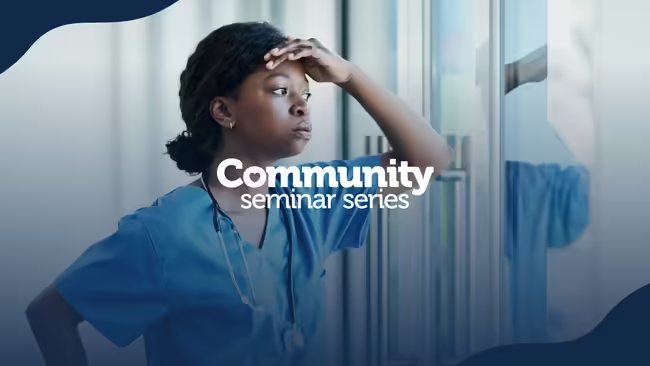
Unpack the mental and physical tolls of chronic workplace stress.
Burnout has negative consequences for individuals, organizations, and society overall. Beyond its impact on the physical and mental health of workers, burnout strains organizations and increases turnover, tardiness, absenteeism, and difficulty in retaining staff. Nurses are particularly at risk of experiencing burnout, and the condition is estimated to affect between 35% to 45% of registered nurses in the United States and 9% to 14% globally. Already considered a public health concern, nurse burnout was further exacerbated by the COVID-19 pandemic.
In this session, learn to identify burnout, understand common risk factors, and follow the latest evidence of how to address burnout in ourselves and others. Presenter: Carolina Carvalho, Ph.D. candidate, Industrial Engineering
If you need a reasonable accommodation to participate, please contact Dee Walls at walls1@illinois.edu. Early requests are strongly encouraged to allow sufficient time to meet access needs.
The Community Seminar Series: Autumn Health Picks
Communities and healthcare professionals need trusted connections to stay informed of emerging advancements in health sciences. Gain research-based insights into complex health issues as researchers from University of Illinois deliver forward-thinking, holistic solutions for addressing today’s health challenges.
Register in advance to attend any or all of the online workshops that begin at noon.
- Registration is required.
- Workshops are free to attend.
- CEUs are available for a fee through the Continuing Education Institute of Illinois (CEII).
- Register for workshop sessions and continuing education units prior to the program date.
- Post-session CEU registration will not be available.
Explore all workshops in the series.
October 5 | Noon
Pharmaceutical Drugs: From Development to Medicine Cabinet
Unpack the basic science behind the drug development process. From the scientist working away in the lab to the tiny pills we see on the shelves at our local pharmacy, how does the pharmaceutical industry actually develop drugs? Why are some drugs taken as pills but others given as syrups? How are drugs marketed consumers? The pharmaceutical industry is huge and can be challenging to navigate but understanding how medications are developed can make us all savvier consumers. Presenter: Apurva Godbole, Ph.D. student, Chemical and Biomolecular Engineering
October 12 | Noon
Coffee and Chocolate: Consumer Preferences, Sensory Properties, and Health Impacts
Coffee and chocolate are both products that seem to be ubiquitous in the lives of people around the world. As types of products and knowledge about them continues to evolve, so do the health claims made about them. Access emerging research to learn about the potential health benefits of products - from cold brew to ruby chocolate and caffeine to flavonoids - and discover their impact on obesity, diabetes, and cardiovascular disease. Presenter: Dee Walls, M.S. University of Illinois Extension Outreach Associate
October 19 | Noon
Aromatherapy in Brain Health: Facts vs. Fiction
Aromatherapy has become increasingly popular due to its pleasant scent and ability to promote relaxation. More recently, there have been claims that aromatherapy can treat a wide range of brain conditions by crossing the blood-brain barrier, but how do we determine fact from fiction when it comes to the proven health benefits of aromatherapy? Explore the most recent studies of aromatherapy‘s impact on brain health in this session. Presenter: Quang Nguyen, Ph.D. student, Molecular and Integrative Psychology
October 26 | Noon
Debunking Common Myth(s) in Psychology and Neuroscience
How much of your brain do you really use each day? Do “left-” and “right-“ brained people actually differ from each other? Will a conk on the head cause amnesia? The latest evidence from neuroscience and psychology debunks these and other common brain myths. Presenter: Grace Clements, Ph.D.
November 2 | Noon
Imposter Syndrome of the Health Professional
From within the academic community to the halls of healthcare organizations and beyond, imposter syndrome drastically affects professionals' job efficiency and mental capacity. The concept of imposter syndrome, which leads to burnout, performance anxiety, and depression, is foreign to some while ever-present for others. More than half of all health professionals - despite being high achieving, highly successful specialists - struggle with feelings of fraud and inadequacy when it comes to their accomplishments and skillset. In this session, trace imposter syndrome from the scholastic level to our current health system and discover potential methods to address its root causes. Presenter: Erica Noel, M.S.
November 9 | Noon
What are the Facts? Dispelling Diet Culture and Nutrition Science Myths
Diet culture is all around us, telling us we are not healthy enough, not active enough, not small enough to be accepted in society. At the same time, nutrition science is constantly evolving, and members of the public need consensus! Unpack diet culture myths that keep us in the dieting cycle and learn how to free ourselves! Presenter: Breanna Metras, Ph.D. student and RDN
November 16 | Noon
Burnout Syndrome in Nursing Professionals
Defined as an occupational syndrome that results from chronic workplace stress, burnout has negative consequences for individuals, organizations, and society overall. Beyond its impact on the physical and mental health of workers, burnout strains organizations and increases turnover, tardiness, absenteeism, and difficulty in retaining staff. Nurses are particularly at risk of experiencing burnout, and the condition is estimated to affect between 35% to 45% of registered nurses in the United States and 9% to 14% globally. Already considered a public health concern, nurse burnout was further exacerbated by the COVID-19 pandemic. In this session, learn to identify burnout, understand common risk factors, and follow the latest evidence of how to address burnout in ourselves and others. Presenter: Carolina Carvalho, Ph.D. candidate, Industrial Engineering
